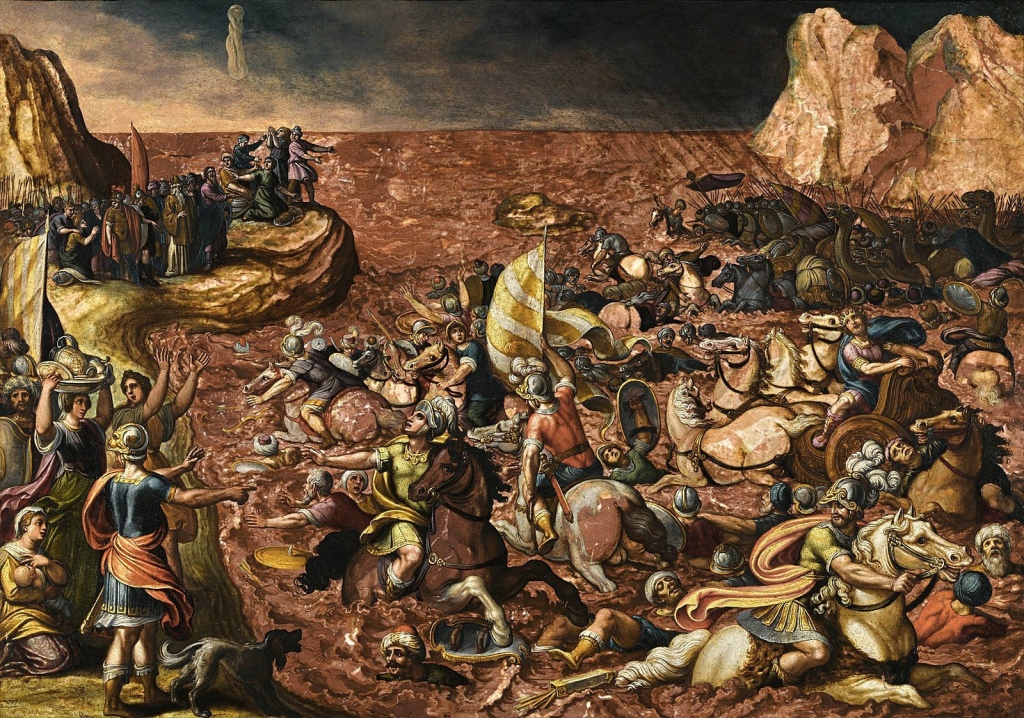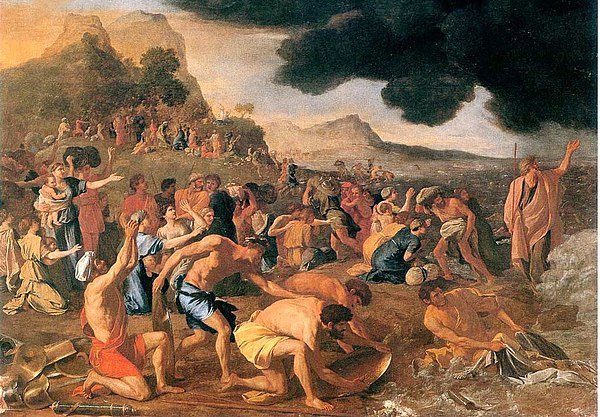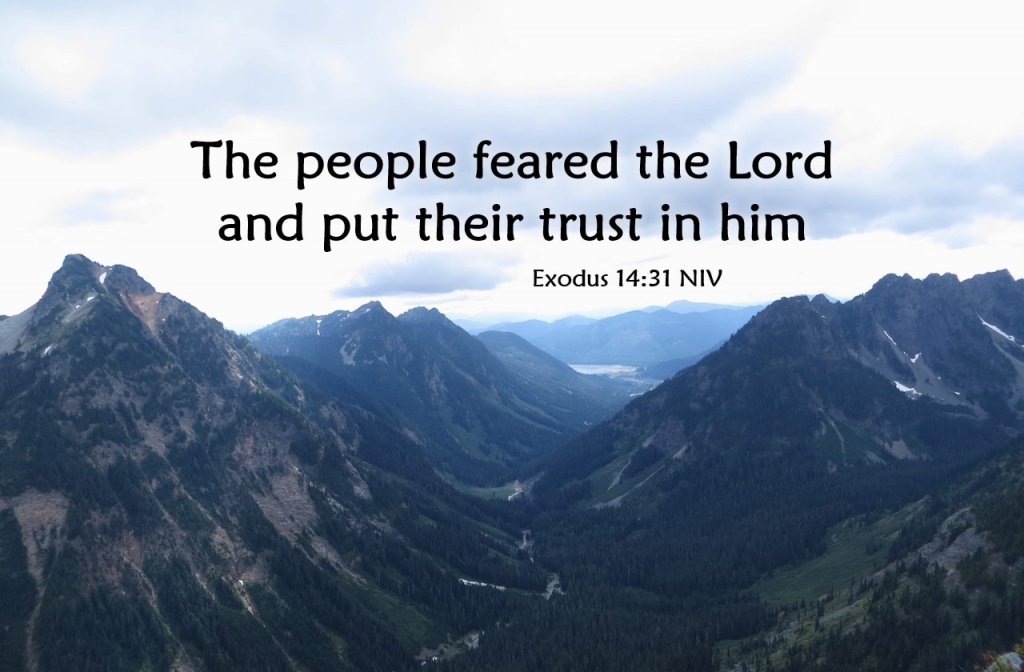“So the Lord saved Israel that day from the Egyptians; and Israel saw the Egyptians dead on the seashore” (Exod 14:20). That’s the statement that tells the story of the Exodus in one short verse; it’s also the ethical problem that sits at the heart of the Exodus story. A part of that story is offered by the lectionary for this coming Sunday (Exod 14:19–31).
I have already offered some reflections on the violence that is central to the story of the Exodus from Egypt; see https://johntsquires.com/2023/09/06/escaping-from-oppression-how-do-we-make-sense-of-the-exodus-exodus-12-pentecost-15a/
As I have noted, there is much violence spread throughout the pages of the Hebrew Scriptures—and the reading proposed by the lectionary for this coming Sunday is no exception! I have no doubt that, for many people, the violent scenes in the “historical” narratives, in the prayers of the psalmists, in the visions of the prophets, is most off-putting. As a pacifist myself, I find these scenes disturbing.
As I have worked with people who have experienced trauma from abuse in their lives, I recognise how they may “work through” these matters in ways that are confronting and hard to handle; I have tried to cultivate an attitude of acceptance of them and curiosity about what drives their angry and violent language. And as a person who myself has experienced the trauma of violence through sexual abuse, when I was a child, I am intensely attuned to the ways that violent words and deeds can impact on people.
For my own story, see
and for the podcast in which I talk about this, go to
https://open.spotify.com/episode/5feSJb2qyVAhzBEfoeHj1x?si=29983b58d694477d
*****
I don’t, of course, hold to each and every event in the biblical narratives as literal historical events; but I do believe that these narratives reflect the zeitgeist of the time. It was a violent time, life was more precarious, people lived in a more tribal fashion (and thus fighting the neighbour was somehow a regular occurrence). And yet, in the midst of this, we see the emergence and development of a spirituality that values something wider than the immediate tribal, parochial viewpoint.
To the extent that the final editors of the many narratives shaped things intentionally, we might note that the stories of the little tribe(s) which later identified together as Israel, were framed by a grand narrative of the cosmic creation (Gen 1–2) and the strategic place of humanity within that creation (Gen 2–3). That, it seems to me, signals the moves that have been made from the violent tribal interactions of many narratives, into the poetic appreciation (mediated via the hierarchical priestly mindset) of the larger global—and spiritual—picture.
Thus, these texts do have some value; but they need to be understood in their detail, in their contexts, and in terms of the whole. They include the earlier stories of their heritage—because the people creating these texts “honour mother and father”, they preserve and retell those stories—but they also show how faithful people grappled with their various situations and challenges.
In Hebrew Scripture, then, we have extended stories constructed by writers seeking to shape the society of their time through a reconstructed (and perhaps idealised) past; songs from psalmists seeking to find God in trying situations; writings from sages plumbing the depths of wisdom and discernment; and oracles from prophets decrying infidelity and lack of commitment to the covenant, using graphic, even violent, language. The whole is a fascinating mix of case studies about “how to be faithful” in changing and challenging circumstances.
The Exodus needs to be seen in this context. It contains poetic sections (Exod 15) celebrating victory after violent engagement; a narrative shaped around that poem; then a further narrative, woven into the existing narrative but expanding or correcting or challenging the earlier material, all included into a literary stream of words that we puzzle, now, to unknot and make sense of.

The story of this Exodus from Egypt came to occupy a central place in the life of the people of Israel. It gained traction as a story that conveyed the identity of the people—once enslaved, miraculously liberated, steadfastly guided, and ultimately rewarded with a place of their own. It was retold in a number of psalms (Psalms 77 and 78; 80 and 81; 105 and 106; 114; 135 and 136).
A standard refrain which recalls the Exodus, “I am the Lord your God, who brought you out of the land of Egypt, out of the house of slavery” (Exod 20:2; Deut 5:6) recurs throughout the ensuing narrative books (Deut 1:27; 5:6; 6:12; 8:14; etc; Judg 2:12; 1 Sam 12:6; 1 Ki 6:1; 8:9, 21; 9:9; 12;28; 2 Ki 17:7, 36; 2 Chron 6:5; 7:22). A number of prophets also recall this story with similar phrases (Jer 7:22, 25; 11:4, 7; 16:14; 23:7; 31:32; 32:21; 34:13; Ezek 20:4–10; Dan 9:15; Hos 11:1; Amos 2:10; 3:1; Mic 6:4; 7:15; Hag 2:5).
In the difficulties of the Exile in Babylon, when the final form of the story as we know it was created, this saga resonated deeply with the confronting experiences and the fervently-held hopes of the people. Their Exile was their Egypt; their Exodus was still awaited, and their entry into the land of Israel remained yet well ahead of them. And so, the story is told of the past, but it becomes a story of the present, a hope for the future, for the people.
It seems to me that the dreaming stories of First Nations Peoples in Australia instruct us about the way that the ancients told their stories, retold and reworked them, and then wrote them down (a step that some First Nations peoples are now taking, under the pressure of western colonisation).
It is quite likely that the same kinds of processes were present in the formation, development, and passing on of the stories of ancient Israel, until such time as it was felt needed to write them down (a step that was clearly taken during the Exile in Babylon and in the years after that, as the people returned to the land of Israel).
The narratives bear witness to the faith of ancient peoples; they reflect life and society as it was, with all its faults as well as its positive points; and they invite us to share in the attitude of faith towards God and the demonstration of justice and care for one another that is reflected in the stories that are told.

What, then, do we make of the story of deliberate, divine-authorised death, which is told in Exodus 14, as we hear in the Hebrew Scripture reading in worship this coming Sunday? The story has become foundational, not only for Jews, but also for Christians, as I noted last week. (See the link above.)
Writing in Bible Odyssey, Professor Brian M. Britt offers this insightful summary of the function of the Exodus mythology over a long, extended period of time. He observes, “The prevalence of the exodus tradition in the Bible demonstrates its importance as a foundational collective memory from ancient Israel that predates the monarchy and survives into the time of the early rabbis and followers of Jesus.
“Postbiblical exodus traditions take many forms, from the Jewish observance of Passover to Christian celebrations of Easter, Muslim teachings about the Prophet Musa, and modern liberation theologies. Though many modern readers have asked whether episodes of the exodus, from the plagues in Egypt to the parting of the Red Sea, “really happened,” the exodus remains one of the most powerful narratives of divine compassion and liberation found in the Bible.”
See
The Exodus Tradition in the Bible

For Jews, this story is foundational. It is both in the remembrance of that first “passing over” at the annual Passover dinner in people’s homes, but also in the self-identity of the people as chosen by the Lord for a special, designated purpose, saved from the antagonisms of hostile surrounding nations, such that the story gains life and becomes effective as a fundamental mythos, a story that explains the very essence of who Jews are.
For Christians, it is in the remembrance of “the night on which the Lord [Jesus] was betrayed”, in the oft-repeated eucharistic celebration in local churches and cathedrals, that the story is foundational. It is part of the central thread of the grand narrative (the death and resurrection of Jesus) that sits at the heart of that religion.
That the story involves bloodshed and death—as well as rescue and salvation—indicates the earthy nature of each faith. Judaism and Christianity alike are grounded in the realities of human existence and deal with factors that are of the essence of human life. It is a foundational story that is important to remember. But that does not mean that the story is without problems.

The fate of the Egyptians, first being bogged in the muddy ground, next panicking as they are subsumed by the waters, and then drowning in the rising sea, is a difficult part of the story. The claim that God deliberately hardens their hearts (14:17) in order to lure them into the waters, is abhorrent. Is this really what God is like? Or is this an element introduced into the story by the narrator, to provide some form of explanation for their fate? I lean to the latter—but it still does not make for easy reading.
This part of the story remains, sitting as an accusatory claim. It is hard to resolve this in a satisfactory way. The Egyptians become a cipher for all with whom the Israelites struggled, over the centuries. They symbolise “the other”; and with the Canaanites, later in the grand narrative, they exercise a peculiar function; a reminder of those who were “in the way” of the grand plan (of God, it was claimed) that was being enacted.
They are difficult people in the way of the story–much like the First Peoples of the continent of Australia and its surrounding islands are “in the way” of the grand colonising, civilising narrative that has been created by powerful white historians, storytellers, and political leaders.
There is, however, another side of the story of Israel, which is presented in the concluding verses of this week’s passage. What happened in the Sea of Reeds is remembered as the day when “the Lord saved Israel … from the Egyptians” (14:20), the day when “Israel saw the great work that the Lord did against the Egyptians” (14:31). It is a story designed to evoke and strengthen faith.
The graphic scene is sketched in few words, but they are telling words: “Israel saw the Egyptians dead on the seashore” (14:30). That is a vastly understated comment. If you have ever seen pictures from the Western Front battles during World War I, you will know that a scene of dead bodies littering the ground is indeed a gruesome and sobering sight. The Exodus story contains just such a devastating scene.
But the whole purpose of the story is not to lament the dead (they are mere collateral damage, in modern terminology). It is to encourage faith and hope amongst those who have continued as faithful in subsequent years. “So the people feared the Lord and believed in the Lord and in his servant Moses” (14:31). Another brief, pointed observation. All’s well that ends well, it would seem—at least, for the victors.

